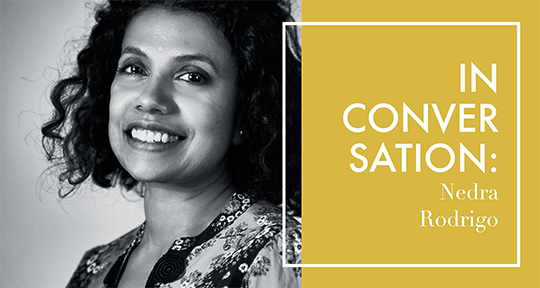Born in Colombo, the community organiser, translator, art curator, and spoken word artist Nedra Rodrigo immigrated to Canada during the twenty-six year Sri Lankan Civil War. Befittingly, she has since worked to delineate refugee writings and the literature of conflict: “When a cultural identity is deeply tied to a landscape through song, poetry, story, or even film, being forced to leave that place, or witness its destruction, erodes the psyche.” She has been translating contemporary literary works from the Tamil, a language spoken widely in her homeland of Eelam or Ilankai (now a part of what is colonially known as Sri Lanka) as well as in India, Malaysia, Singapore, Fiji, Mauritius, and South Africa.
In a panel discussion in late October 2023 titled ‘Unsettling Borders: Translation’s Intimate Labours’, Nedra spoke from her experience as the translator of Tamil Eelam revolutionary leader Thamizhini’s memoir Oru kuurvaaLin Nizhalil (published as In the Shadow of a Sword for SAGE Yoda India in 2021): “Although weaponised, literary translation is driven by hope … that we can know one another and that our experiences can be permeable to each other through language.”
In this interview, I conversed with Nedra on tinai as the affinity of literature and land; her translations of Tamil writers; refugee-settler writings, and the literature of war and exile, among other things.
Alton Melvar M Dapanas (AMMD): You have rendered the works of Tamil-language writers R. Cheran, V.I.S. Jayapalan, Puthuvai Ratnathurai, and Rashmy into English. I wonder about your translation process, given the variety not just of writers but also of genres, aesthetics, and modes you translate from.
Nedra Rodrigo (NR): The first few poems I translated, I did so out of necessity. I had approached a wonderful Tamil translator, Prof. Chelva Kanaganayagam, for some poems, and he pushed me to translate them myself. I entered into it with a lot of hesitancy because I was never convinced that I could bring the kind of emotion I experienced while reading the Tamil poems across into English. Once I became more confident in my capacity to reclaim the language, I could go beyond the words to think more about the contexts and genres of the poetry, and try to bring different tones and textures to the translation. The work I’ve translated is generally focused around the war in Sri Lanka, so I also see the ways in which these texts act as archives, containing forms of knowledge that the majoritarian state continues to try to erase. So, my process is often a balancing act between maintaining the aesthetics and the historical content of the source text. The more I read, the more I realise how much these texts are also often in conversation with each other, and with the literatures of other oppressed cultures.
Very few translators have the luxury of doing nothing but translate, and I often have to juggle my translation work with my paying work and community work. I try to give my headspace over to one text at a time, so I ‘live’ with one author or poet for a while. It’s a challenge of translation, that you hold meaning in your head in two languages as you weigh it back and forth. Precision means a lot to me, so I often sit with my research as well as my own memories to try to do justice to this work. I think I’ve done best when I have been able to work consistently, every day—even if it’s just a page. READ MORE…


